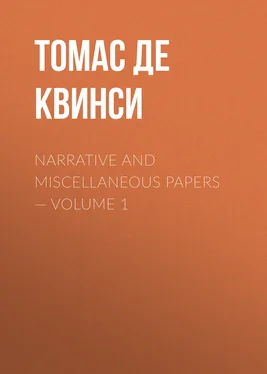Томас Де Квинси - Narrative and Miscellaneous Papers — Volume 1
Здесь есть возможность читать онлайн «Томас Де Квинси - Narrative and Miscellaneous Papers — Volume 1» — ознакомительный отрывок электронной книги совершенно бесплатно, а после прочтения отрывка купить полную версию. В некоторых случаях можно слушать аудио, скачать через торрент в формате fb2 и присутствует краткое содержание. Жанр: foreign_prose, literature_19, foreign_antique, на английском языке. Описание произведения, (предисловие) а так же отзывы посетителей доступны на портале библиотеки ЛибКат.
- Название:Narrative and Miscellaneous Papers — Volume 1
- Автор:
- Жанр:
- Год:неизвестен
- ISBN:нет данных
- Рейтинг книги:3 / 5. Голосов: 1
-
Избранное:Добавить в избранное
- Отзывы:
-
Ваша оценка:
- 60
- 1
- 2
- 3
- 4
- 5
Narrative and Miscellaneous Papers — Volume 1: краткое содержание, описание и аннотация
Предлагаем к чтению аннотацию, описание, краткое содержание или предисловие (зависит от того, что написал сам автор книги «Narrative and Miscellaneous Papers — Volume 1»). Если вы не нашли необходимую информацию о книге — напишите в комментариях, мы постараемся отыскать её.
Narrative and Miscellaneous Papers — Volume 1 — читать онлайн ознакомительный отрывок
Ниже представлен текст книги, разбитый по страницам. Система сохранения места последней прочитанной страницы, позволяет с удобством читать онлайн бесплатно книгу «Narrative and Miscellaneous Papers — Volume 1», без необходимости каждый раз заново искать на чём Вы остановились. Поставьте закладку, и сможете в любой момент перейти на страницу, на которой закончили чтение.
Интервал:
Закладка:
'With household motions light and free,
And steps of virgin liberty'
you might have supposed her some Hebe or young Aurora of the dawn. When you saw only her superb figure, and its promise of womanly development, with the measured dignity of her step, you might for a moment have fancied her some imperial Medea of the Athenian stage—some Volumnia from Rome,
'Or ruling bandit's wife amidst the Grecian isles.'
But catch one glance from her angelic countenance—and then combining the face and the person, you would have dismissed all such fancies, and have pronounced her a Pandora or an Eve, expressly accomplished and held forth by nature as an exemplary model or ideal pattern for the future female sex:—
'A perfect woman, nobly plann'd,
To warm, to comfort, to command:
And yet a spirit too, and bright
With something of an angel light.'
To this superb young woman, such as I have here sketched her, I surrendered my heart for ever, almost from my first opportunity of seeing her: for so natural and without disguise was her character, and so winning the simplicity of her manners, due in part to her own native dignity of mind, and in part to the deep solitude in which she had been reared, that little penetration was required to put me in possession of all her thoughts; and to win her love, not very much more than to let her see, as see she could not avoid, in connection with that chivalrous homage which at any rate was due to her sex and her sexual perfections, a love for herself on my part, which was in its nature as exalted a passion and as profoundly rooted as any merely human affection can ever yet have been.
On the seventeenth birthday of Agnes we were married. Oh! calendar of everlasting months—months that, like the mighty rivers, shall flow on for ever, immortal as thou, Nile, or Danube, Euphrates, or St. Lawrence! and ye, summer and winter, day and night, wherefore do you bring round continually your signs, and seasons, and revolving hours, that still point and barb the anguish of local recollections, telling me of this and that celestial morning that never shall return, and of too blessed expectations, travelling like yourselves through a heavenly zodiac of changes, till at once and for ever they sank into the grave! Often do I think of seeking for some quiet cell either in the Tropics or in Arctic latitudes, where the changes of the year, and the external signs corresponding to them, express themselves by no features like those in which the same seasons are invested under our temperate climes: so that, if knowing, we cannot at least feel the identity of their revolutions. We were married, I have said, on the birthday—the seventeenth birthday—of Agnes; and pretty nearly on her eighteenth it was that she placed me at the summit of my happiness, whilst for herself she thus completed the circle of her relations to this life's duties, by presenting me with a son. Of this child, knowing how wearisome to strangers is the fond exultation of parents, I shall simply say, that he inherited his mother's beauty; the same touching loveliness and innocence of expression, the same chiselled nose, mouth, and chin, the same exquisite auburn hair. In many other features, not of person merely, but also of mind and manners, as they gradually began to open before me, this child deepened my love to him by recalling the image of his mother; and what other image was there that I so much wished to keep before me, whether waking or asleep? At the time to which I am now coming but too rapidly, this child, still our only one, and unusually premature, was within four months of completing his third year; consequently Agnes was at that time in her twenty-first year; and I may here add, with respect to myself, that I was in my twenty-sixth.
But, before I come to that period of wo, let me say one word on the temper of mind which so fluent and serene a current of prosperity may be thought to have generated. Too common a course I know it is, when the stream of life flows with absolute tranquillity, and ruffled by no menace of a breeze—the azure overhead never dimmed by a passing cloud, that in such circumstances the blood stagnates: life, from excess and plethora of sweets, becomes insipid: the spirit of action droops: and it is oftentimes found at such seasons that slight annoyances and molestations, or even misfortunes in a lower key, are not wholly undesirable, as means of stimulating the lazy energies, and disturbing a slumber which is, or soon will be, morbid in its character. I have known myself cases not a few, where, by the very nicest gradations, and by steps too silent and insensible for daily notice, the utmost harmony and reciprocal love had shaded down into fretfulness and petulance, purely from too easy a life, and because all nobler agitations that might have ruffled the sensations occasionally, and all distresses even on the narrowest scale that might have re-awakened the solicitudes of love, by opening necessities for sympathy, for counsel, or for mutual aid, had been shut out by foresight too elaborate, or by prosperity too cloying. But all this, had it otherwise been possible with my particular mind, and at my early age, was utterly precluded by one remarkable peculiarity in my temper. Whether it were that I derived from nature some jealousy and suspicion of all happiness which seems too perfect and unalloyed—[a spirit of restless distrust, which in ancient times often led men to throw valuable gems into the sea, in the hope of thus propitiating the dire deity of misfortune, by voluntarily breaking the fearful chain of prosperity, and led some of them to weep and groan when the gems thus sacrificed were afterwards brought back to their hand by simple fishermen, who had recovered them in the intestines of fishes—a portentous omen, which was interpreted into a sorrowful indication that the deity thus answered the propitiatory appeal, and made solemn proclamation that he had rejected it]— whether, I say, it were this spirit of jealousy awaked in me by too steady and too profound a felicity—or whether it were that great overthrows and calamities have some mysterious power to send forward a dim misgiving of their advancing footsteps, and really and indeed,
'That in to-day already walks to-morrow;'
or whether it were partly, as I have already put the case in my first supposition, a natural instinct of distrust, but irritated and enlivened by a particular shock of superstitious alarm; which, or whether any of these causes it were that kept me apprehensive, and on the watch for disastrous change, I will not here undertake to determine. Too certain it is that I was so. I never ridded myself of an over-mastering and brooding sense, shadowy and vague, a dim abiding feeling (that sometimes was and sometimes was not exalted into a conscious presentiment) of some great calamity travelling towards me; not perhaps immediately impending—perhaps even at a great distance; but already—dating from some secret hour—already in motion upon some remote line of approach. This feeling I could not assuage by sharing it with Agnes. No motive could be strong enough for persuading me to communicate so gloomy a thought with one who, considering her extreme healthiness, was but too remarkably prone to pensive, if not to sorrowful, contemplations. And thus the obligation which I felt to silence and reserve, strengthened the morbid impression I had received; whilst the remarkable incident I have adverted to served powerfully to rivet the superstitious chain which was continually gathering round me. The incident was this—and before I repeat it, let me pledge my word of honor, that I report to you the bare facts of the case, without exaggeration, and in the simplicity of truth:—There was at that time resident in the great city, which is the scene of my narrative, a woman, from some part of Hungary, who pretended to the gift of looking into futurity. She had made herself known advantageously in several of the greatest cities of Europe, under the designation of the Hungarian Prophetess; and very extraordinary instances were cited amongst the highest circles of her success in the art which she professed. So ample were the pecuniary tributes which she levied upon the hopes and the fears, or the simple curiosity of the aristocracy, that she was thus able to display not unfrequently a disinterestedness and a generosity, which seemed native to her disposition, amongst the humbler classes of her applicants; for she rejected no addresses that were made to her, provided only they were not expressed in levity or scorn, but with sincerity, and in a spirit of confiding respect. It happened, on one occasion, when a nursery-servant of ours was waiting in her anteroom for the purpose of taking her turn in consulting the prophetess professionally, that she had witnessed a scene of consternation and unaffected maternal grief in this Hungarian lady upon the sudden seizure of her son, a child of four or five years old, by a spasmodic inflammation of the throat (since called croup) peculiar to children, and in those days not very well understood by medical men. The poor Hungarian, who had lived chiefly in warm, or at least not damp, climates, and had never so much as heard of this complaint, was almost wild with alarm at the rapid increase of the symptoms which attend the paroxysms, and especially of that loud and distressing sound which marks the impeded respiration. Great, therefore, was her joy and gratitude on finding from our servant that she had herself been in attendance more than once upon cases of the same nature, but very much more violent,—and that, consequently, she was well qualified to suggest and to superintend all the measures of instant necessity, such as the hot-bath, the peculiar medicines, &c., which are almost sure of success when applied in an early stage. Staying to give her assistance until a considerable improvement had taken place in the child, our servant then hurried home to her mistress. Agnes, it may be imagined, dispatched her back with such further and more precise directions as in a very short time availed to re-establish the child in convalescence. These practical services, and the messages of maternal sympathy repeatedly conveyed from Agnes, had completely won the heart of the grateful Hungarian, and she announced her intention of calling with her little boy, to make her personal acknowledgments for the kindness which had been shown to her. She did so, and we were as much impressed by the sultana-like style of her Oriental beauty, as she, on her part, was touched and captivated by the youthful loveliness of my angelic wife. After sitting for above an hour, during which time she talked with a simplicity and good feeling that struck us as remarkable in a person professing an art usually connected with so much of conscious fraud, she rose to take her leave. I must mention that she had previously had our little boy sitting on her knee, and had at intervals thrown a hasty glance upon the palms of his hands. On parting, Agnes, with her usual frankness, held out her hand. The Hungarian took it with an air of sad solemnity, pressed it fervently, and said:—'Lady, it is my part in this life to look behind the curtain of fate; and oftentimes I see such sights in futurity—some near, some far off—as willingly I would not see. For you, young and charming lady, looking like that angel which you are, no destiny can be equal to your deserts. Yet sometimes, true it is, God sees not as man sees; and he ordains, after his unfathomable counsels, to the heavenly-minded a portion in heaven, and to the children whom he loves a rest and a haven not built with hands. Something that I have seen dimly warns me to look no farther. Yet, if you desire it, I will do my office, and I will read for you with truth the lines of fate as they are written upon your hands.' Agnes was a little startled, or even shocked, by this solemn address; but, in a minute or so, a mixed feeling—one half of which was curiosity, and the other half a light-hearted mockery of her own mysterious awe in the presence of what she had been taught to view as either fraud or insanity—prompted her playfully to insist upon the fullest application of the Hungarian's art to her own case; nay, she would have the hands of our little Francis read and interpreted as well as her own, and she desired to hear the full professional judgment delivered without suppression or softening of its harshest awards. She laughed whilst she said all this; but she also trembled a little. The Hungarian first took the hand of our young child, and perused it with a long and steady scrutiny. She said nothing, but sighed heavily as she resigned it. She then took the hand of Agnes—looked bewildered and aghast—then gazed piteously from Agnes to her child—and at last, bursting into tears, began to move steadily out of the room. I followed her hastily, and remonstrated upon this conduct, by pointing her attention to the obvious truth—that these mysterious suppressions and insinuations, which left all shadowy and indistinct, were far more alarming than the most definite denunciations. Her answer yet rings in my ear:—'Why should I make myself odious to you and to your innocent wife? Messenger of evil I am, and have been to many; but evil I will not prophecy to her. Watch and pray! Much may be done by effectual prayer. Human means, fleshly arms, are vain. There is an enemy in the house of life,' [here she quitted her palmistry for the language of astrology;] 'there is a frightful danger at hand, both for your wife and your child. Already on that dark ocean, over which we are all sailing, I can see dimly the point at which the enemy's course shall cross your wife's. There is but little interval remaining—not many hours. All is finished; all is accomplished; and already he is almost up with the darlings of your heart. Be vigilant, be vigilant, and yet look not to yourself, but to Heaven, for deliverance.'
Читать дальшеИнтервал:
Закладка:
Похожие книги на «Narrative and Miscellaneous Papers — Volume 1»
Представляем Вашему вниманию похожие книги на «Narrative and Miscellaneous Papers — Volume 1» списком для выбора. Мы отобрали схожую по названию и смыслу литературу в надежде предоставить читателям больше вариантов отыскать новые, интересные, ещё непрочитанные произведения.
Обсуждение, отзывы о книге «Narrative and Miscellaneous Papers — Volume 1» и просто собственные мнения читателей. Оставьте ваши комментарии, напишите, что Вы думаете о произведении, его смысле или главных героях. Укажите что конкретно понравилось, а что нет, и почему Вы так считаете.












